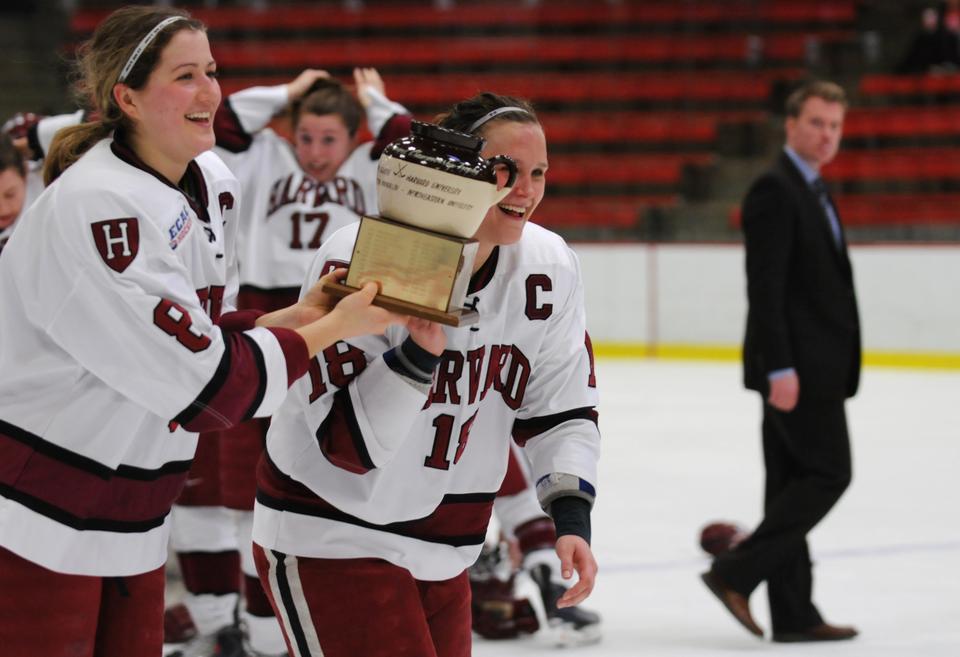
News
Summers Will Not Finish Semester of Teaching as Harvard Investigates Epstein Ties

News
Harvard College Students Report Favoring Divestment from Israel in HUA Survey

News
‘He Should Resign’: Harvard Undergrads Take Hard Line Against Summers Over Epstein Scandal

News
Harvard To Launch New Investigation Into Epstein’s Ties to Summers, Other University Affiliates

News
Harvard Students To Vote on Divestment From Israel in Inaugural HUA Election Survey
SEASON RECAP: Hockey Earns NCAA Tournament Home Ice Advantage

Resilience—that was the mantra of the Harvard women’s hockey team this season.
Though the Crimson was without its usual luxury of Olympic-level talent and was plagued by injuries all year, it still managed to earn home-ice advantage in the NCAA tournament after posting a 20-8-5 record (13-6-3 ECAC) with an undefeated nonconference slate.
“I think a lot of people doubted this team and didn’t think we were going to be very good at all this year, and we kind of came together behind that,” junior forward Kate Buesser said. “It felt good to prove people wrong and continue the success.”
Having graduated its top three scorers—two-time Olympic gold medalist Sarah Vaillancourt ’08-’09, Jenny Brine ’09, and Sarah Wilson ’09—Harvard took solace in its star power at the other end of the ice, where senior goaltender Christina Kessler turned away other teams’ forwards at will. Kessler set the NCAA all-time career save percentage record in the 2009-10 campaign, becoming the Crimson’s all-time winningest netminder in what would be the final game of her career. When junior forward Liza Ryabkina returned from a dislocated knee in late November, all the pieces seemed to have fallen in place for Harvard.
After Ryabkina pushed the Crimson past Dartmouth in her first game back on the ice, Harvard hit its stride, twice shutting out the University of Minnesota in one weekend. The Gophers hadn’t been blanked since 2007.
“The Minnesota series was great,” Harvard coach Katey Stone said. “That certainly made us believers.”
But Ryabkina and Kessler only had six games together before a torn ACL ended Kessler’s collegiate career.
“I think we had one period of hockey all season where everyone was healthy,” Stone said. “We recognize that we were resilient.”
In Kessler’s absence, co-captains Cori Bassett and Kathryn Farni and junior Leanna Coskren took charge. The trio’s blue-line stability helped freshman netminder Laura Bellamy step into a heated ECAC playoff race without missing a beat. Bellamy posted three shutouts and an overall record of 10-5-2 between the pipes.
“That’s a tough role to fill after Kessler, and she did a great job,” Stone said.
With its defense shutting the opposition down, Harvard demonstrated versatility, creativity, and grit on offense. Instead of weakening the Crimson, the graduation of star forwards allowed Harvard to diversify its offense, finding heroes in unexpected places.
“Everyone on the team took it upon themselves to find whatever their role was,” Farni said. “I think people were really self-aware of what needed to be done and what was appropriate for them to do.”
The skaters excelled in their roles in early February, when the Crimson opened the month by extending a win streak to six games and taking the Beanpot title.
When RPI stopped the streak, putting the Crimson’s playoff positioning in jeopardy, an unlikely star raised her game to a new level. Senior forward Randi Griffin, a role player for much of her career, found her niche as a scorer at the perfect time. In the last weekend of the ECAC regular season, with postseason seedings on the line, the senior scored the game-winning goal against St. Lawrence.
The next afternoon, she scored all three of Harvard’s goals in a 3-3 tie with Clarkson—giving the Crimson the third seed in the playoffs.
“We had a great group of kids who got better and better all the time due to the strong leadership of our seniors,” Stone said.
In its first playoff series, Harvard dominated Princeton, taking both games by a combined margin of seven goals. But it was all heartbreak after the easy victories over the Tigers. Clarkson kept the Crimson out of the ECAC championship game with a 3-2 victory in the conference semifinals. Harvard’s season then ended in the first round of the NCAA tournament, as it dropped a 6-2 contest to upstart Cornell—which would make a run all the way to the NCAA championship game—at home.
“We were disappointed with how we played down the stretch,” Stone said. “Our expectations had grown.”
But even in the loss, it was fitting that a Crimson skater, Coskren, scored the final goal against Cornell. Harvard, having overcome obstacles all season, was unwilling to stop fighting, even in the face of a five-goal deficit.
—Staff writer Christina C. McClintock can be reached at ccmcclin@fas.harvard.edu.
Want to keep up with breaking news? Subscribe to our email newsletter.
